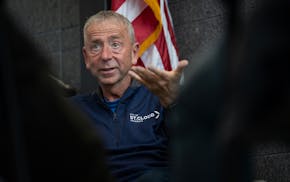I read the entire series of articles the Star Tribune recently published on the Dakota uprising, and was surprised to learn that the federal law that bans Dakota from Minnesota is still in the books. That is pathetic.
Also, the recent ceremony officially welcoming the Dakota back into the state took place not far west of me, but I did not hear anything about it until reading the paper last Saturday.
I do hope we can honor, recognize and aid Native Americans consistently and practically, not just with words but with deeds. And I hope we do not simply parade issues out on anniversary dates to ease our guilt over failures, past and present.
These articles had a sharp editorial slant. That concerns me, because we are talking about real people here. This is not a work of fiction. The Star Tribune has a responsibility to be careful with all it wishes to judge, and to be fair and realistic with all parties, not simply to crudely lionize or scapegoat them.
It wants to tell the story of the "underdog," but remember that there is no end to the underdogs in this story. Life is never simple. And no amount of after-the-fact editorial slant is going to do anything for anyone who is living in the aftermath of this history, even after all these years.
I hope this is not just an exercise in society's using long-dead people to craft a morality play so as to feel better about itself today.
The articles lay the blame for the uprising solely on government officials for failing the tribes -- which were already, apparently, quite dependent on them -- and on crooked elements that did much to defraud them. The articles also impress upon the reader time and again that this uprising was at least intended to target the military primarily.
All well and good. But if we want to be truthful and fair, we have to acknowledge that remote and isolated settlers, far removed from and not involved in any dealings between their government and these tribes, bore the brunt of the horrific violence. Here is one firsthand account, from an 1864 compilation of personal narratives:
"The daughter of Mr. Schwandt, enceinte [pregnant], was cut open, as was learned afterward, the child taken alive from the mother, and nailed to a tree. The son of Mr. Schwandt, aged thirteen years, who had been beaten by the Indians, until dead, as was supposed, was present, and saw the entire tragedy. He saw the child taken alive from the body of his sister, Mrs. Waltz, and nailed to a tree in the yard. It struggled some time after the nails were driven through it! This occurred in the forenoon of Monday, 18th of August, 1862."
Gov. Alexander Ramsey and the leaders of that day had to respond to and act for a civilian people who had profound fear and anger about the brutal violence done unto them. Remember also that the Civil War was being fought at the time. The uprising came at a very vulnerable time for Minnesota and for the country. In 1862, the outcome of that war was still in doubt, and so was the fate of the Union.
Back before this state used public money and pulltabs to build sport stadiums for every game in town, these Minnesotans helped build a nation. Is our present-day society so self-impressed and complacent that it cannot give its due to the lives and sacrifices and deaths of those who got us here?
And when are we planning on giving the land back to the Dakota?
I hope that in the year 2012 we are not so false and proud to think that when we look back on the early history of the people of our state, we are looking in a downward direction. They might not be so impressed with us, either.
__________________
Anthony Iverson is a carpenter in Currie, Minn.

Kudos to St. Cloud's longtime mayor
Readers Write: Ethnic studies curriculum, public notice laws, student protests

